Thursday, 12 November 2015
From membrane excitability to subjective consciousness
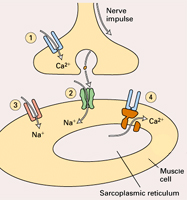
When people tell me that they’d like to understand more about how their brain works, I often respond teasingly that first they should probably ask what they use it for. Because you don’t use your brain only for its obvious, “proximal” functions, such as thinking, talking, understanding, laughing, crying, riding a bicycle, philosophizing, and simultaneously being aware of doing all those things. In that sense, unhelpful as this answer may seem, you actually use your brain for everything: everything you do, including sleeping or daydreaming, involves co-ordinated activity on the part of your brain.
No, what I’m talking about is the brain’s ”distal” (ultimate) function. In other words, how and for what reason did the first nervous systems evolve? (more…)
From the Simple to the Complex | Comments Closed
Thursday, 15 October 2015
Inhibitory Neurons: More Than Just a Brake
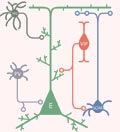
Neuroscientists have known that the brain contains glial cells just as long as they have known that it contains neurons, but only in the past two or three decades have scientists discovered the actual importance of glial cells for communication within the brain. Similarly, neuroscientists have long known that between the large excitatory neurons of the cerebral cortex, there are a multitude of small inhibitory neurons. Once thought to act as simple “brakes” on brain activity, these inhibitory neurons have gradually been found to display far more complex variations in their nature, form, connectivity and function than was originally believed. (more…)
Mental Disorders | Comments Closed
Tuesday, 22 September 2015
Seeing without knowing it : the strange phenomenon of blindsight
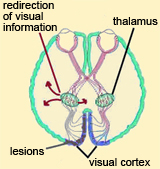 This week I’d like to share some information about the fascinating phenomenon of blindsight, along with links to other articles on this subject. People can become blind as the result of damage to the retina, but in rarer cases blindness can occur when both sides of the visual cortex are damaged. The latter situation can lead to the strange phenomenon known as blindsight or unconscious vision, in which people believe that they can’t see anything, but can nevertheless correctly identify the positions of objects in space. If you ask these people where a certain object or point of light is, they will say they don’t know, but if you insist and ask them to take a chance, guess, and point in the direction where they think the object or light might be, most of the time, they’ll point in the right direction. (more…)
This week I’d like to share some information about the fascinating phenomenon of blindsight, along with links to other articles on this subject. People can become blind as the result of damage to the retina, but in rarer cases blindness can occur when both sides of the visual cortex are damaged. The latter situation can lead to the strange phenomenon known as blindsight or unconscious vision, in which people believe that they can’t see anything, but can nevertheless correctly identify the positions of objects in space. If you ask these people where a certain object or point of light is, they will say they don’t know, but if you insist and ask them to take a chance, guess, and point in the direction where they think the object or light might be, most of the time, they’ll point in the right direction. (more…)
The Senses | Comments Closed
Tuesday, 1 September 2015
Memory Loss in Alzheimer’s Reduced for the First Time
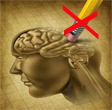
On November 4, 1906, German neurologist Alois Alzheimer first described the “particular malady of the cerebral cortex” of his patient Auguste D. Over a century later, this “particular malady” that now bears his name still resists every medication developed so far to treat it: none has yet succeeded in halting the progress of Alzheimer’s disease, or even in slowing it down. At best, some medications reduce some of the disease’s symptoms. In the past decade alone, an estimated $1 billion has been swallowed up by clinical trials of new Alzheimer’s medications, with almost nothing to show for them.
But after decades of disappointment, the tide may be turning at last. A preliminary study published in September 2014 by Dr. Dale Bredesen, in the journal Aging, suggests that the memory losses associated with Alzheimer’s can be reversed through an elaborate 36-point treatment program including dietary changes, exercise, intellectual stimulation and other activities that had already been recognized as Alzheimer’s prevention factors separately. But in this case, it is the unusual step of combining them that seems to have curative value. (more…)
Mental Disorders | Comments Closed
Monday, 10 August 2015
What’s running our show?
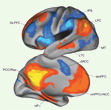
Deric Bownds, director of the Biology of Mind program at the University of Wisconsin-Madison, recently gave a lecture at this institution’s seminar series on chaos and complexity. The lecture was entitled “Upstairs/Downstairs in our brains – What’s running our show?” (You can find the full text by following the link at the bottom of this post.) Its subject was the increasingly common distinction, in the literature on the brain, between bottom-up and top-down control. This literature also employs other metaphors for opposing processes in the brain, such as the famous System 1 (fast and unconscious) versus System 2 (slower and conscious), the “upstairs/downstairs” metaphor in the title of Bownd’s lecture, and the distinction between the attention network (the parts in blue in the illustration here) and the default mode network (the parts in orange). (more…)
From Thought to Language | Comments Closed







